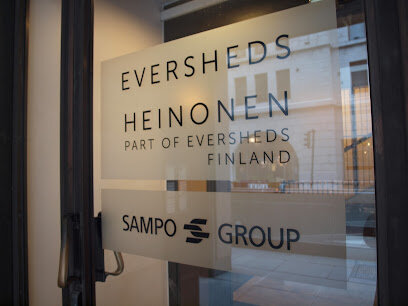Best Art & Cultural Property Law Lawyers in Helsinki
Share your needs with us, get contacted by law firms.
Free. Takes 2 min.
List of the best lawyers in Helsinki, Finland
About Art & Cultural Property Law in Helsinki, Finland
Art & Cultural Property Law in Helsinki, Finland, is a specialized area of law that deals with the legal issues surrounding the creation, ownership, and transfer of art and cultural property. This field encompasses a wide array of subjects, including intellectual property rights, heritage preservation, the transfer and repatriation of cultural artifacts, and compliance with international conventions. In Helsinki, as part of a country that values its cultural heritage, there is a concerted effort to protect national interests while respecting international commitments. This makes navigating these laws both complex and essential for practitioners and stakeholders in the arts community.
Why You May Need a Lawyer
There are numerous situations where legal assistance in Art & Cultural Property Law may be necessary. Artists may seek to protect their intellectual property rights or navigate the complexities of copyright laws. Collectors and museums might require guidance on acquiring or selling artwork, especially concerning provenance and authenticity. Legal advice can be crucial during disputes over ownership of cultural artifacts or when negotiating loan agreements for international exhibitions. Furthermore, institutions might need to ensure compliance with national and international laws related to the protection and repatriation of cultural heritage.
Local Laws Overview
In Helsinki, and Finland broadly, Art & Cultural Property Law is influenced by both national legislation and international agreements. Key legal aspects include:
- Copyright Act: Protects creators’ rights over their artistic works and specifies the duration and scope of these rights.
- Act on the Return of Cultural Objects: Governs the restitution and repatriation of cultural objects to their countries of origin, aligned with EU directives.
- National Antiquities Act: Protects archaeological sites and historic environments, requiring permits for excavation and export of cultural properties.
- Safeguarding Finland’s Cultural Heritage: Laws and regulations aimed at preserving and managing national cultural heritage.
Frequently Asked Questions
What is considered cultural property under Finnish law?
Cultural property generally includes objects of historical, artistic, or cultural significance. These can range from artworks and artifacts to buildings and landscapes of historical relevance.
How are disputes over artwork ownership typically resolved in Finland?
Disputes can be resolved through negotiations, mediation, or legal proceedings in courts where evidence, provenance, and relevant laws are examined to determine rightful ownership.
Do artists in Finland automatically own the rights to their work?
Yes, creators automatically own the copyright to their work under Finnish law. This includes the right to reproduce, distribute, and display their work publicly.
What international conventions influence Finnish Art & Cultural Property Law?
Finland is a party to several international conventions, including the UNESCO Convention on the Means of Prohibiting the Illicit Import, Export, and Transfer of Ownership of Cultural Property and the UNIDROIT Convention on Stolen or Illegally Exported Cultural Objects.
Are there tax considerations to keep in mind when buying art in Helsinki?
Yes, there can be tax implications for purchasing art, including VAT and potential deductions if the art is acquired for a business. Consulting a lawyer specialized in tax law can provide clarity.
What steps are involved in exporting cultural property from Finland?
Exporting cultural property often requires a permit, especially for items of significant cultural heritage. Applications are assessed by relevant authorities to ensure compliance with protection regulations.
Can museums request the return of cultural artifacts from Helsinki?
Yes, under certain circumstances, national and international laws support the restitution of cultural artifacts. Each case is reviewed based on its legal and historical context.
What protections do Finnish laws provide for artists against unauthorized use of their work?
Finnish copyright law prohibits unauthorized reproduction, distribution, or display of an artist's work, and legal remedies are available for infringement.
How are cultural artifacts protected during international exhibitions?
Loan agreements typically delineate responsibilities for safeguarding artifacts, and insurance is often secured to cover potential damage or loss during transit and display.
Are digital artworks protected under Finnish copyright law?
Yes, digital artworks are protected under copyright law. The same principles apply to digital creations as to traditional forms of art.
Additional Resources
Consider these resources for further information and assistance:
- The Finnish Heritage Agency: Provides guidance on cultural heritage protection.
- The Artists' Association of Finland: Offers resources and support for practicing artists.
- The Ministry of Education and Culture: Responsible for cultural policies and oversight.
- Finnish Copyright Society: Offers information on copyright laws and practices.
Next Steps
If you need legal assistance in Art & Cultural Property Law, consider the following steps:
- Determine the specific nature of your legal issue to seek specialized expertise.
- Consult with an attorney or a law firm specializing in art and cultural property law to understand your rights and obligations.
- Gather all related documentation, such as provenance papers, previous sale records, or copyright registrations, to facilitate legal discussions.
- Consider alternative dispute resolution methods, such as mediation, to resolve conflicts more amicably before proceeding with litigation.
Lawzana helps you find the best lawyers and law firms in Helsinki through a curated and pre-screened list of qualified legal professionals. Our platform offers rankings and detailed profiles of attorneys and law firms, allowing you to compare based on practice areas, including Art & Cultural Property Law, experience, and client feedback.
Each profile includes a description of the firm's areas of practice, client reviews, team members and partners, year of establishment, spoken languages, office locations, contact information, social media presence, and any published articles or resources. Most firms on our platform speak English and are experienced in both local and international legal matters.
Get a quote from top-rated law firms in Helsinki, Finland — quickly, securely, and without unnecessary hassle.
Disclaimer:
The information provided on this page is for general informational purposes only and does not constitute legal advice. While we strive to ensure the accuracy and relevance of the content, legal information may change over time, and interpretations of the law can vary. You should always consult with a qualified legal professional for advice specific to your situation.
We disclaim all liability for actions taken or not taken based on the content of this page. If you believe any information is incorrect or outdated, please contact us, and we will review and update it where appropriate.

















